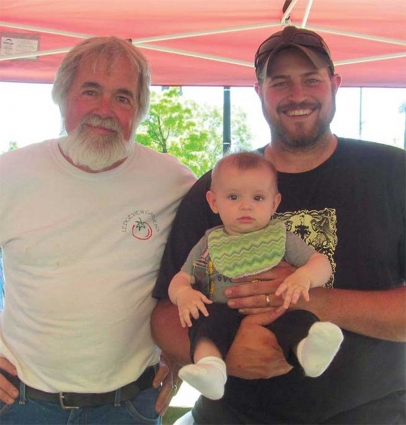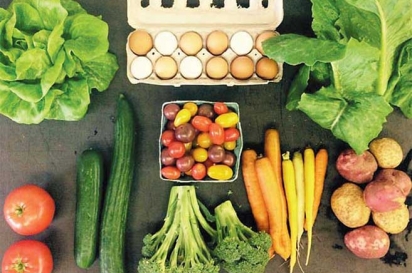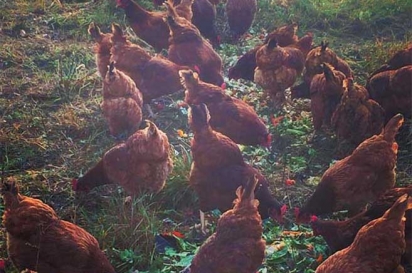From Soda Pop to Tomatoes, Ledgeview Gardens Got its Start
SON SHARES FATHER’S PASSION AT LEDGEVIEW GARDENS
Tomatoes started it all. In 2001, when Joe Vollmar announced to his family that he was going to quit his job at the Pepsi bottling company in De Pere and grow tomatoes full time, his then teenage son Darren was skeptical.
“It seemed crazy at the time but boy was I wrong,” said Darren Vollmar. Growing food to feed others was a serious interest for Joe Vollmar.
“My dad always had a really big garden. He would grow enough in it to feed us, the neighbors and have a stand at the farmers market. We always had a lot of vegetables and varieties, and he didn’t use any kind of chemicals … He always had an organic approach to gardening,” Darren said.
He still has that approach, only on a much larger scale. Now Darren is older, he’s a bit wiser, he loves tomatoes, too, and is his dad’s business partner with Ledgeview Gardens. Located on Cottonwood Lane in De Pere, Ledgeview Gardens specializes in growing pesticide-free produce in a sustainable manner. Vegetables and fruit are grown in three large hydroponic greenhouses, in soil hoop houses and on 18 acres of land.
Joe’s interest in organic growing practices is what drew him to hydroponics, an automated system that delivers food to plants by mixing natural minerals and nutrients into water. The plants receive just what they need just when they need it. At Ledgeview Gardens, three connected greenhouses with no walls in between supports a tube system that delivers the water and nutrients to the rows of large growing pots filled with Perlite, a natural soilless growing medium of natural absorbent volcanic rock. A computer system tracks sunlight and heat rates, then adjusts the mixture of nutrients and water needed in the feeding cycle. The plants grow and the fruit is harvested at peak ripeness.
The biggest benefit to hydroponic growing of produce is the efficient use of space. In 8,000 square feet, Ledgeview Gardens can grow the same amount of tomatoes as 20 acres of soil. The high-tech system also saves water, labor and time.
The first year of growing in the hydroponic greenhouses was a steep learning curve. The Vollmars started strong and ended up with huge results—and mixed blessings, of sorts.
“The first year we were way in over our heads as far as quantity goes. We started with one large fruited variety, the beefsteak tomato— and nothing else. Just those big red tomatoes. Each house produces one ton of large fruit per week, so that was three tons of tomatoes per week! And it did produce as predicted so then the problem was getting rid of them all,” said Darren, who can now laugh at the memory. They sourced the tomatoes to local grocery stores and as many area farmers markets as they could and learned from the experience.
Adding variety was the next step for Ledgeview Gardens. Now the tomato varieties include cluster-grown tomatoes (smaller fruit sold on the vine in a small cluster), orange beefsteak tomatoes with lower acidity levels and cherry and grape tomatoes. And one of the greenhouses now grows seedless, burpless English cucumbers, which are wildly popular. “As many cucumbers as we can grow, we sell,” said Vollmar. “We are doing maximum planting of cucumbers.”
The Vollmars also added lettuce, growing the heads hydroponically in a NFT (nutrient film technique) bench system that resembles shallow rain gutters. Salanova is a lettuce that is grown as a head but with a single cut is harvested as a loose-leaf lettuce. It has been the lettuce of choice. The harvesting process is simple and with eight varieties, a nice mix can easily be created.
Just before winter sets in, hardy greens like spinach and Asian greens are planted in the greenhouse. The greens begin to grow and when cold temperatures set in, the plants go into a slow growing state. Darren harvests lettuce for local restaurants every several weeks in the winter and, when spring arrives, the lettuce is ready to prolifi cally produce.
“Our biggest customer for spinach and lettuce in early spring is the De Pere School District. We bring it to middle school and they break it down, process it and distribute the greens to the rest of the schools,” Vollmar said. “The school saves all the salad bar scraps and puts them in a bin for me. We use the scraps to feed our chickens. We are working together to get this perfect circle going.”
Ledgeview Gardens also produces traditional soil-grown produce such as melons, peppers, carrots, beans, onions, and garlic, eggs and meat birds. The 300 laying chickens receive organic feed and pasture graze during the day. At night they sleep and lay their eggs in a large portable coop built on a boat trailer. About 70 dozen eggs are collected a week. Ledgeview Gardens also grows about 500 meat birds a year. The meat birds are raised in small groups in coops that are moved to a new patch of grass one-to-two times a day.
Always trying to keep up with new ideas and customer interests, Ledgeview Gardens began a CSA last year and had 50 members. “The boxes are filled with desirable products that can be easily used in a week,” Vollmar said. Customers selected between 24-week, 16-week and 8-week options as well as an egg CSA option.
Darren Vollmar has a passion for farming that is easy to recognize and he loves to interest others in what they do on the farm, including posting videos of farm life on YouTube.
“I am addicted to farming and I can’t tell you why … I sure do love to farm. I am passionate about organic and I am passionate about having local food,” Vollmar said. “And, I am always interested in how to do things better … I like the challenge of how to do it better.”







